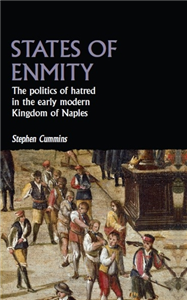Your Search Results
-
Promoted Content
-
Promoted Content
-
 Trusted Partner
Humanities & Social SciencesAugust 2026
Trusted Partner
Humanities & Social SciencesAugust 2026Morisco knights in Renaissance Spain
The Granada Venegas family in history and memory
by Elizabeth Terry-Roisin
How does a Morisco enter the Spanish nobility? This book reveals the cultural strategies through which a family of converts from Islam to Christianity overcame limpieza de sangre laws, rose in social status, avoided King Philip III's Morisco expulsions of 1609-14, and achieved a noble title. Drawing on archival sources from both Spain and Italy to re-create the original family archive, this book follows the Granada Venegas family from Granada, to Madrid, to the dusty Andalucían town of Campotéjar, of which they became Marquises, and finally to Italy. Their descendants would serve as Doges of Genoa in the eighteenth century.
-
 Trusted Partner
Humanities & Social SciencesDecember 2024
Trusted Partner
Humanities & Social SciencesDecember 2024States of enmity
The politics of hatred in the early modern Kingdom of Naples
by Stephen Cummins
State of enmity explores how relations of hatred and enmity played political and social roles in the early modern Kingdom of Naples. Exploring the pervasive notion of enmity and practices of reconciliation, the book provides new insight into the social dynamics of southern Italy in the early modern period. In particular, widespread banditry and the violent tenor of local politics are analysed through a wide variety of criminal trials and other sources.
-
 Trusted Partner
Literature & Literary StudiesJanuary 2004
Trusted Partner
Literature & Literary StudiesJanuary 2004Theatre and religion
Lancastrian Shakespeare
by Richard Dutton, Alison Findlay, Richard Wilson
This important collection of essays focuses on the place of Roman Catholicism in early modern England, bringing new perspectives to bear on whether Shakespeare himself was Catholic. In the Introduction, Richard Wilson reviews the history of the debate over Shakespeare's religion, while Arthur Marotti and Peter Milward offer current perspectives on the subject. Eamon Duffy offers a historian's view of the nature of Elizabethan Catholicism, complemented by Frank Brownlow's study of Elizabeth's most brutal enforcer of religious policy, Richard Topcliffe. Two key Catholic controversialists are addressed by Donna Hamilton (Richard Vestegan) and Jean-Christophe Mayer (Robert Parsons). Robert Miola opens up the neglected field of Jesuit drama in the period, whilst Sonia Fielitz specifically proposes a new, Jesuit source-text for Timon of Athens. Carol Enos (As You Like It), Margaret Jones-Davies (Cymbeline), Gerard Kilroy (Hamlet) and Randall Martin (Henry VI 3) read individual plays in the light of these questions, while Gary Taylor's essay fittingly investigates the possible influence of religious conflicts on the publication of the Shakespeare First Folio. Theatre and religion: Lancastrian Shakespeare as a whole represents a major intervention in this fiercely contested current debate. ;
-
 Trusted Partner
March 1986
Trusted Partner
March 1986Sade. Fourier. Loyola
by Roland Barthes, Maren Sell, Jürgen Hoch
»Nicht aus Lust am Provozieren sind Sade, Fourier und Loyola in ein und demselben Buch zusammengestellt worden, sondern weil alle drei Klassifikatoren, Sprachbegründer waren: der verfemte Schriftsteller begründete eine Sprache des erotischen Vergnügens, der utopische Philosoph eine Sprache des sozialen Glücks und der heilige Jesuit eine Sprache der Anrufung Gottes. Zeichen erfinden und nicht, wie wir es alle tun, nur konsumieren heißt paradoxerweise in den Bereich jenes Nachhinein des Sinns einzutreten, der das signifiant darstellt, kurz, eine Schreibweise praktizieren. Daher beschäftigt sich dieses Buch auch nicht mit dem Inhalt der Schriften dieser drei Autoren (…), sondern es behandelt Sade, Fourier und Loyola als Formulierer, Erfinder von Schreibweisen, Textoperateure.« Roland Barthes
-
 Trusted Partner
Trusted Partner
-
 Trusted Partner
Trusted Partner
Last Paths to Freedom. French Girl Guides in resistance to Nazi Germany
by Thomas Seiterich
Summer 1940. Nazi Germany annexes Alsace, but not without resistance: in the Catholic parish of St. Jean, very close to the Great Synagogue, six French Girl Guides opened an underground border crossing for opponents of the regime, Jews, Communists and the military. They explored and found secret routes across the Vosges to the west, and south to Switzerland. By the time the Gestapo picked them up in 1942, they had brought around 500 people to safety. Freisler tried them in 1943 and sentenced six of them to death by guillotine. Pope Pius XII demanded that the women be spared. And Hitler did indeed pardon them – with the proviso that they were not allowed to know. They all survived.














